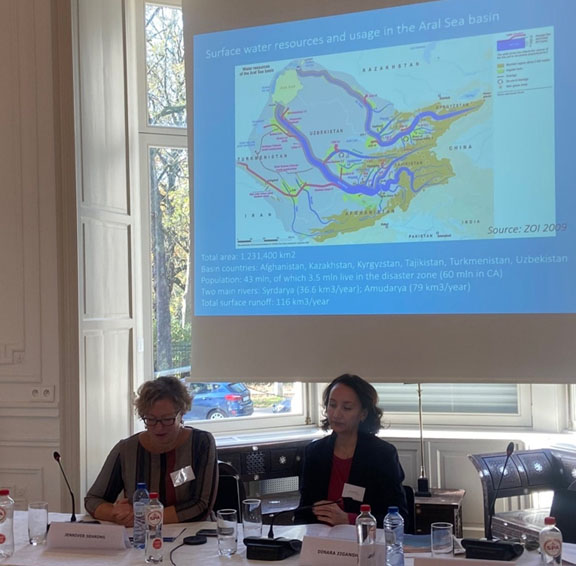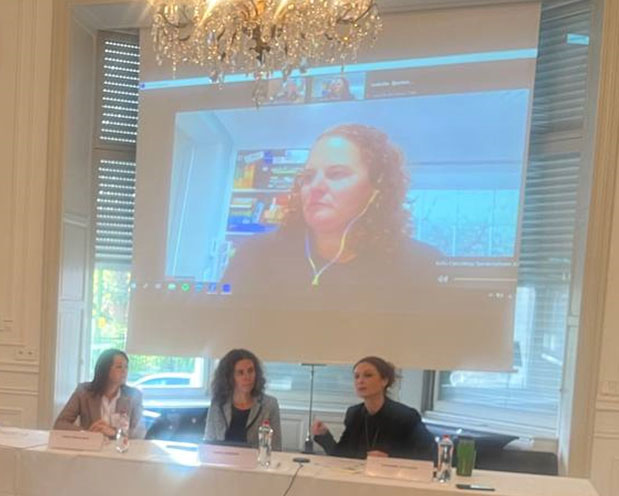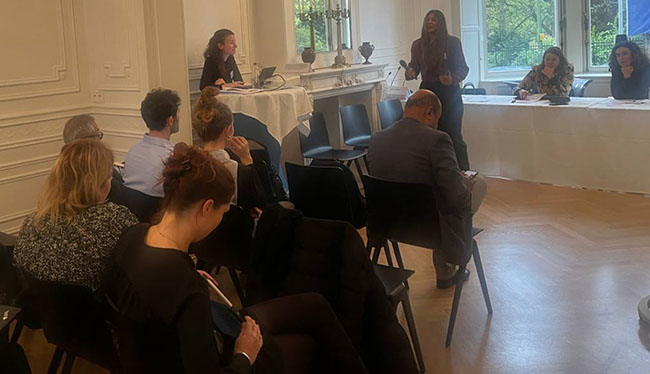HYDRODIPLOMACY: BUILDING AND STRENGTHENING TRANSBOUNDARY WATER GOVERNANCE INSTITUTIONS
European office of the Konrad Adenauer Foundation hosted the conference “Hydrodiplomacy: Building and Strengthening Transboundary Water Governance Institutions” on November 2-3, 2022 in Brussels. The participants considered the issues of transboundary water management and climate change on examples of Central Asia, Himalayas and the Middle East.
Sonja Koppel, Secretary of the UNECE Water Convention made the introductory speech on international law and cooperation on shared rivers.
The first session was devoted to presentation of the results of the hydrodiplomacy pre-conference study (available online). Nilanjan Ghosh and Dipak Gyawali presented the report “Water governance in the Himalayas: re-thinking institutions, science and transboundary cooperation.” Efficiency, challenges and potential of regional organizations for transboundary waters in the Aral Sea Basin and the Euphrates and Tigris Basin were discussed by Dinara Ziganshina and Jenniver Sehring and Hamza Shareef and Tugba Evrim Maden, respectively.

Then in groups the participants discussed the effectiveness of governance and decision making procedures in Central Asia, Himalayas, and the Middle East, focusing on science-policy interaction, EU and international community involvement, and expectations of regional partners from development partners.
At the second session “Water insecurity: identifying ways for global water cooperation and the role of public-private partnerships”, Tania Pentcheva (senior manager government and industry relations, Xylem Inc.), Jacqueline Tront (water resources and environmental systems, WB) and Ambassador Tanja Miskova (Slovenian Ministry for Foreign Affairs) took the floor. Jenniver Sehring presented the book entitled “Gender dynamics in transboundary water governance: feminist perspectives on water conflict and cooperation”, which was published in July 2022 under the editorship of J. Sehring, R. Horst, and M. Zwarteveen.

During the third session “Transboundary river commissions: water-energy-food nexus cooperation” Aurelien Dumont (UNESCO project officer), Jacqueline Nyirakamana (chairperson of the Nile Basin Initiative, Ministry of Environment, Rwanda), Susanne Schmeier (Associate Professor of water law and diplomacy, IHE Delft), and Dinara Ziganshina, Director of SIC ICWC. Dr. Ziganshina noted, in particular, the positive role of river commissions in maintaining transboundary cooperation, peace and stability. The key ingredients of success are the diversity of river commissions in terms of form and structure for solution of specific tasks in individual basins, the transformability and adaptability to changing situation, the technical expertise and a platform for permanent dialogue.
The challenges of transboundary cooperation for ensuring energy security (with engagement of Markus Fischer from the largest Danish Orsted company) and food security were addressed in small groups.
Helge Zeitler, environmental expert of EC made a report on the key role of water in climate actions and policies.
Then, the participants discussed the priorities of EU’s hydrodiplomacy and issues to be addressed at COP27 and the 2023 UN Water Conference. It was noted, in particular, that the priorities should: facilitate data exchange and their democratization and expansion of global water conventions; include actions at subnational level, where water conflicts prevail; focus on water-energy-food-ecosystem nexus, the linkage between humanitarian interventions and development projects, the water footprint in production chains, and the importance of research and analytical centers; contextualize interventions; support dialogue along with achievement of concrete results on more effective water use.

Key messages:
- bilateral agreements allow taking many controversial issues off the table but should be better integrated into basin-wide arrangements;
- capacity building is an important element of sustainable water management and transboundary cooperation; however, more systemic and balanced approach is needed for better effectiveness and sustainability;
- data and information exchange are in the heart of efforts on building capacities of water governance institutions; however, data reliability and transparency challenges remain unsolved;
- the role and potential use of public-private partnership is insufficiently studied and understood by decision makers;
- the processes of negotiation on new agreements or revision of existing ones should involve all stakeholders, including affected communities and sectors;
- understanding of gender differences in combination with other factors (age, social status, professional affiliation, ethnic background or race, etc.) may help to better assess and see how to improve water management at national and transboundary levels;
- it is important to rely not only on customary approaches but also initiate new approaches and new thinking to solve current and future challenges;
- facilitating exchange of views and dialogue among experts from different disciplines, basins and regions helps to better understand the situation and propose workable solutions.
|